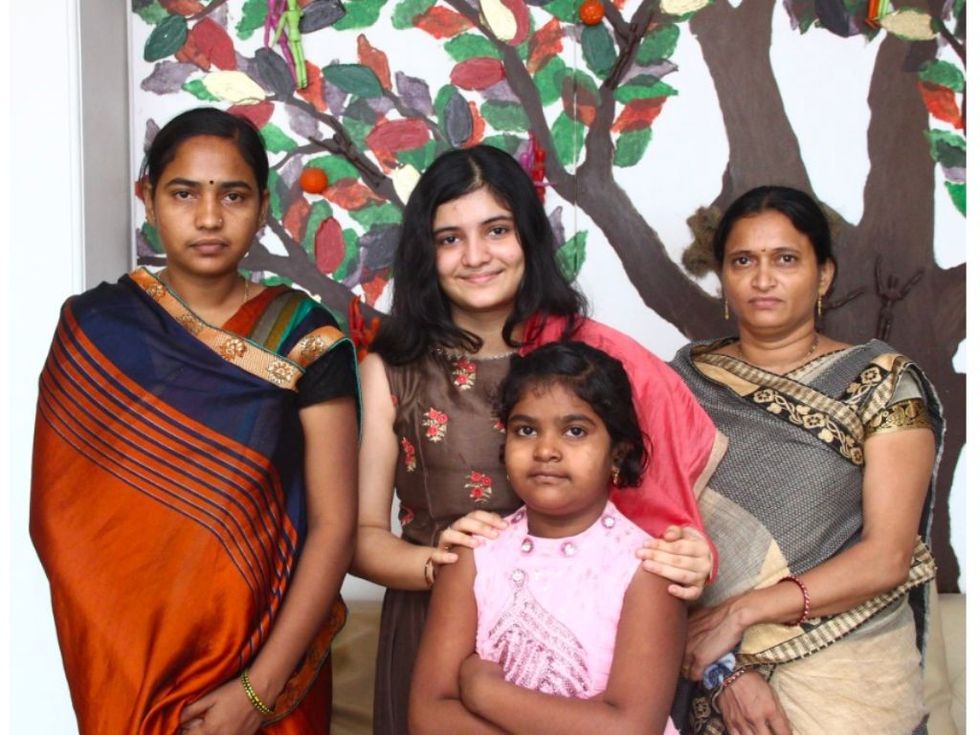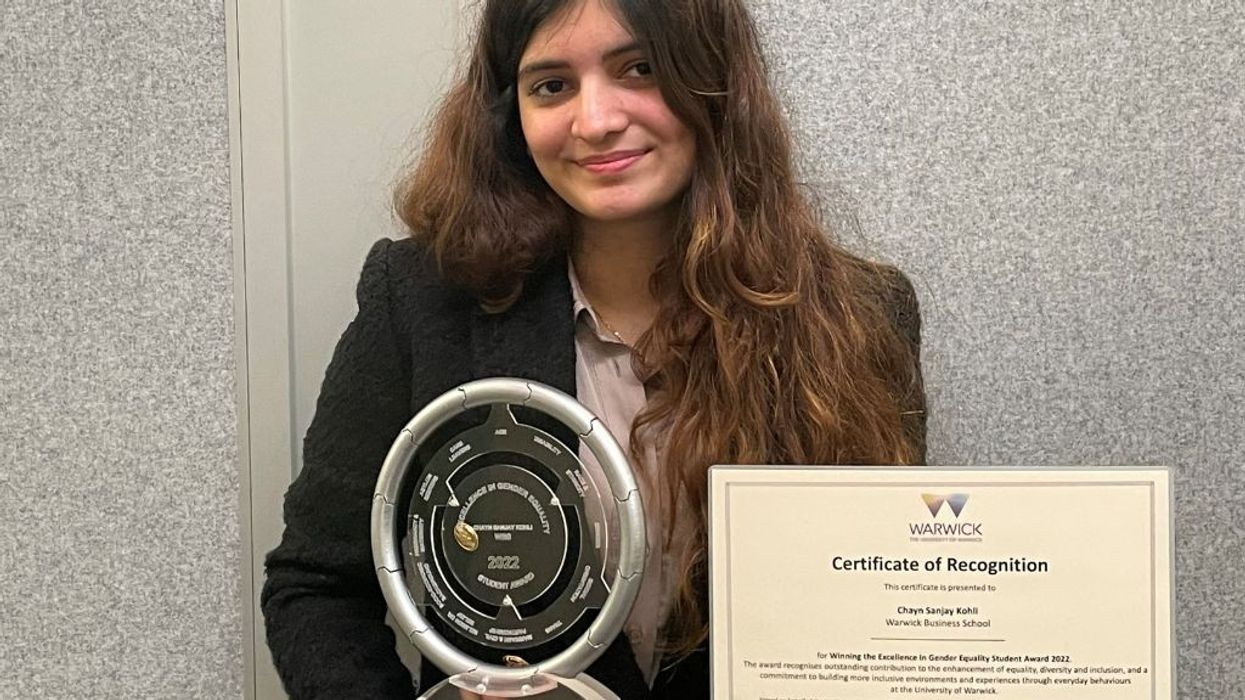For Chayn Sanjay Kohli, a second-year BSc student in Management at Warwick Business School, her journey towards gender equality and women’s empowerment started during a football league in Mumbai, her home town some years ago.
At the football event, women players between 18 and 35 had taken part and since it was a month-long affair, Kohli had opportunities to speak to them. She discovered during her conversations that a majority of the women had not revealed their participation to their families because their parents were not okay with daughters playing a sport.
“There was one girl who told me that she was taking tuitions so that she could pay for taking part in the football league as her father wouldn’t agree. This incident was one which inspired me to take up the issue even more,” Kohli told Eastern Eye, regretting the inequality that still rules the minds of many as even today, several parents do not entertain their daughters’ dreams if they fall outside gender-based stereotypes.

But the 19-year-old, who recently received the University of Warwick’s Student Award for Excellence in Gender Equality 2022, has been a relentless warrior to fight the challenge since she was 14.
She started her journey by going to a village on the outskirts of Mumbai, where she was born and brought up, and educated women on menstruation, hygiene, and sex – topics that are considered taboos in India, more so in the rural parts. The experience was not too smooth for Kohli. She said such health topics pose psychological, social, and health challenges for young women living in the hinterland.
“I had people with me, knowledgeable and experienced, who then talked to the local people, not just the women, and convinced them that there was nothing wrong in receiving such education, and then it worked,” Kohli told this publication, explaining her first experience in striving for gender equality.

Kohli, however, doesn’t consider herself a gender equality activist. She feels that the journey is a long one and at the moment, she enjoys taking small steps towards a noble goal. Her first event about educating women was an initiative she herself had led and there were people, including her mother, a doctor, an elderly teacher, who accompanied her.

Starting from that first experience, has she seen any positive change in the area of gender equality all these years?
“A big change in the mindset,” Kohli said.
She felt that people now have a more open mind on the severity of the issue of gender inequality and how it should be dealt with. She also feels that accessibility has become bigger for women, be it in employment or education and thanked the spread of the internet as one of the reasons.
“The accessibility in male-dominated industries has increased. Community and people are also giving more respect to women now than before,” Kohli said.
But the fight is far from over, especially when it comes to opportunities for women from disadvantaged communities, she reminded.
Kohli’s major area of operation in India has been Maharashtra, her home state. She works around in villages in the state and even took up the responsibility of sponsoring education of girls from the state who lost their soldier fathers in the Pulwama terror attack in Jammu and Kashmir in February 2019. Having tried her hands in social campaigns such as healthcare, Kohli gets into various engagements whenever she is in India.
“When I visit home next March or June, I will conduct classes to teach women from disadvantaged communities on mehndi, jewellery making so that they can become financially independent. These are simple things to learn and it is easy to teach women,” Kohli, who is not fluent in Marathi and communicates in Hindi when doing her social work, told Eastern Eye.
The differences in gender inequality in India and Warwick
Today, Kohli is equally active in handling issues in Warwick, where she went to study in 2021. When she asked whether she found any differences in India and Warwick when it comes to gender inequality, she said the common problem remains a lack of awareness but the nature of the problem differs.
“In the UK, women are mostly unaware of the opportunities they can monetise while in India, they need to convince their families and employers about their capabilities. Families there are keen to educate their sons while the daughters do not get equal opportunities,” she said.
In Warwick, Kohli helps women monetise the opportunities that come their way. She works for Warwick Women’s Career Society which brings out magazines and podcasts and runs assessment centres, cv clinics that provide help to women to advance in their jobs particularly in male-dominated industries. Discussions are held on world affairs and issues that generally concern gender equality in the UK and more precisely, instances that women face in Warwick.
Kohli is also the vice president of the Indian National Student Association where she works on creating opportunities that women typically find less accessible, including networking opportunities.
While she works on promoting gender equality in both the countries, Kohli feels it is the level of education which makes a big difference at the end of the day.
“In rural India particularly, many fathers even today want their girls to become housemakers instead of going after their dreams. Women in the UK know that you have to receive education to start their career, have the opportunity and support to back it up. The quality of education for women in the UK is something that girls in many parts of India can only dream of,” she said, adding that while working with women from disadvantaged backgrounds in India, she found that many of them were fascinated by the fact that she could speak in English.
Influential names have extended helping hands
Social work in India gets a big boost if it gets the backing or endorsement of celebrities, who are often considered role models in the country. Kohli’s initiatives have been no exception.
“I won’t take names but a lot of people from the media and other popular industries have indeed encouraged me. When I received an award in India, a lot of people talked to me. When I started sponsoring the education of daughters of Indian soldiers killed in Pulwama, a number of influential producers generously donated large amounts to help the cause. Actresses and other successful corporate women have helped,” she said, adding that it is a positive thing not only in terms of contributions but women who are struggling to make an identity for themselves can feel motivated to see others who have been through the same situation and made it big.
Despite the disadvantages that women face in India, one has to acknowledge that they have made significant progress in various fields. What is Kohli’s take on this?
“A big change in mindset is certainly happening. I was going through statistics and saw that in the 1970s and 1980s, India’s Rajya Sabha and Lok Sabha had a 4.3 per cent inclusion rate for women which went up to 10.6 per cent in 2013. Women are getting more opportunities in the corporate world, finance industry. They are fighting for their dreams to the last and the positive thing is that males have been supportive. Husbands today are supporting their wives. But still there is a big way to go,” she said.
Citing an example, Kohli said while the Indian women cricket team is doing wonders, the viewership part is still not encouraging. “How many people view the men's cricket team and how many follow the women's team? That needs to change,” she said.
Going forward, Kohli looks forward to attracting more people to help her in the cause. She has more plans in mind to help women become more independent and attain employment skills and most importantly, to continue educating women from rural backgrounds. She also intends to start her own social entrepreneur business at home.
Acknowledging the fact that her university has also been an inspiration for her, Kohli said by interacting with diverse people and seeing the institution running various campaigns to make women feel more included and equal, she got new ideas and applied them while working with women back home.
Gender equality is something Kohli is passionate about and no matter what else she does in life, this is something that would never be off her table. She will be back to India after her study at Warwick concludes and carry on with her work.




